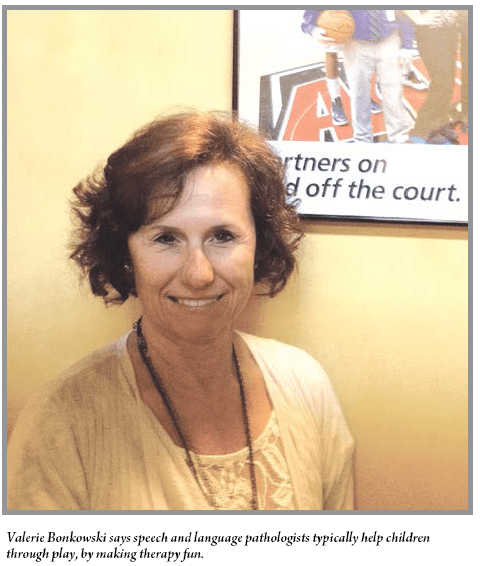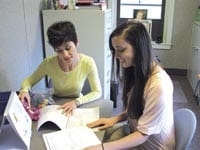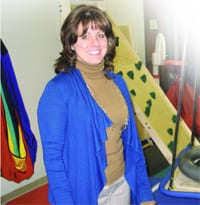Talking It Out Many Factors Can Influence Speech and Language Delays
It can be scary for parents when their toddler doesn’t seem to be communicating as he or she should — unable to string together words, for instance, or having trouble answering questions. However, speech and language delays are very common in children, and around three-quarters of so-called ‘late talkers’ simply outgrow the issue in time — often with the help of trained pathologists and, crucially, the active engagement of their parents.
In Monica Locklin’s workplace, progress is often measured in very small increments — but those small steps are still reason for celebration.
“Even our on-the-cusp moments are exciting,” said Locklin, speech-language supervisor at Holyoke Medical Center (HMC), whose job involves, among other things, working with children with speech and language delays. “For example, we had a dad come in yesterday. I was telling the child to call him ‘Dad’ — he was a hairsbreadth away; the tongue was where it was supposed to be. He didn’t do it. But the dad came in and said, ‘he’s gonna do it,’ and we all felt that it was coming.”
When young children struggle with expressing and assigning meaning to speech, every step forward is a milestone, she added. “It’s great when a kid learns to say ‘tuh’ instead of ‘kuh.’”

There are plenty of reasons why children struggle to express themselves. Some — for example, conditions on the autism spectrum, or apraxia, a disconnect between what the brain wants to say and how the mouth moves — require more specialized services, but in reality, speech delays are very common and often clear up with some simple therapy and active engagement by parents.
“While parents get very concerned, 70{06cf2b9696b159f874511d23dbc893eb1ac83014175ed30550cfff22781411e5} to 80{06cf2b9696b159f874511d23dbc893eb1ac83014175ed30550cfff22781411e5} of late talkers will outgrow it, as long as it’s only an expressive language delay,” said Valerie Bonkowski, a speech and language pathologist at Baystate Medical Center. “When we talk about an expressive language delay, kids are not putting together their words to form phrases and sentences. If that’s the only thing wrong, there’s a good chance they’ll outgrow it.”
If a parent is concerned, she said, “our biggest recommendation is to go to their doctor and ask to be referred to a speech and language pathologist. When they come to see us, we go through several different parts of an assessment. We want to look at, is it just an expressive language delay, or are there other issues going on? Are they following directions?”
If they’re not, she added — if they don’t seem to be receiving information properly — there could be more clinical issues going on. “But if they’re processing and understanding, we try to rule out other things. We look at oral motor disorder — is there something wrong the structures in the mouth preventing them from expressing themselves? Are their oral motor structures working?
“Then you have all the other big buzzwords, like autism,” Bonkowski continued. “Are they showing good social interaction, using language correctly, asking for things, commenting about things? A child may be able to say phrases and sentences, but are they just echoing them?”
Then there’s the matter of exposure to multiple languages at home, which often delays language development. In short, there are plenty of possible factors at play.
“In terms of speech, if the parent feels like they are translating and interpreting for the child constantly, that’s a red flag,” Locklin said. “Around language development, I would say if a parent has that gut feeling, if their child is just not engaging in an appropriate way, not following directions in an appropriate way, or family and friends are concerned, that’s a good place to begin.”
Straight Talk
Locklin paused to note the difference between speech and language. In short, speech is the verbal expression of language and includes articulation, which is the way sounds and words are formed. Language refers to how people express and receive information.
“Speech is the sound of language,” she said, “and language is the process of putting those words together to communicate thoughts and ideas.”
Although speech and language problems differ, they often overlap. For example, a child with a language problem may be able to pronounce words well but be unable to put more than two words together. Another child’s speech may be difficult to understand, yet they string together words and phrases to express ideas. Still another child may speak well, but have difficulty following directions.
“When you talk to a child, do they look at you? Do they respond with facial expressions appropriate for the context of the situation?” Locklin asked, adding that age-appropriate speech milestones aren’t universal for all children, but parents can identify certain red flags. “Does the child connect with you? Does the speech follow a pattern you can pick up on?”
Even baby talk is understandable to parents because it has a pattern they can quickly identify, she added. “Some children don’t have those typical patterns. And when we talk about language, does the child respond to questions? Does the child request items? These are real foundational skills.”
As a medical facility — Locklin works in the hospital’s Speech and Hearing Center — “we do tend to see kids with repairs of cleft palates, congenital issues, craniofascial disorders, Down syndrome, a ton of genetic predispositions of language disorders, and hearing loss,” she said, stressing that audiologists are often called upon to confirm or eliminate hearing issues as causes of speech delays.
“We do an evaluation, identify areas of need, identify strengths, and write specific goals for that child, incorporating their general ability to access the world,” she noted. “It really is not the same as school — we’re not looking for how this child accesses their academics, but how do they access the world, how do they communicate with friends and neighbors?
“We explain that this isn’t magic,” Locklin was quick to add, stressing that parents have a responsibility to continue exercises, therapies, and a more focused engagement with their children at home.
“We’re empowering parents to look at things a different way, to see that they’re in charge of their children’s future,” she told HCN. “Some parents hear a diagnosis and are so afraid. But the opportunities are endless, how much change you can impart in your children, just by changing the way you engage with them.”
Janice Walker, manager of the HMC Speech and Hearing Center, said reading to children with language delays is important, but only if they regularly stop to talk about what they’re reading. Even taking a walk outside or running errands, “you can turn everything into a vocabulary experience — ‘look, a brown dog. Look at the sun in the sky. Look at those red roses.’
“We spend a lot of time doing parent teaching,” Walker added. “Some are naturals at that; other parents, we show them things to do, but they won’t remember them. We want to teach the parent to be the tutor.”
Work and Play
Bonkowski said pediatricians generally stay on top of speech development early in life, asking parents if the child is keeping up with milestones. “If they’re referred to us, we’ll do an evaluation. Say he can’t follow directions; we might work on improving that. If he’s not expressing himself, then we focus on that. When they’re younger, the most important factor is working with the parent. We mostly support and guide the parent. They come in to see us, and we’ll model what they should do when they go home.”
There are many simple strategies for overcoming speech delays, absent any major clinical factors, she said, ranging from using small words and clear gestures to incorporating music in at-home exercises to, well, having fun. “Playing is the best format for any child to get talking. That’s what we do in speech therapy; we’re always doing some sort of play, making it fun.”
When doctors refer children to Baystate’s outpatient speech program, “we rule out things like hearing issues, family history, oral structural problems — it could be the environment; maybe the parents aren’t making it important.” As for the intervention itself, “some kids can come out of it quite quickly with early treatment. Others, because of what caused the issue, may take a lot longer.”
The bottom line, she said, is that parents shouldn’t be afraid to bring their concerns to their pediatrician. “They’ll figure out if a referral to a speech pathologist is necessary, and the speech pathologist can figure out what’s causing it and what direction to go.”
Unfortunately, Walker said, insurers are starting to put more of a squeeze on her field, making it more difficult for parents to access care, especially for kids who are over 3 — past the early years when many problems are first evaluated — but haven’t started school yet. “It’s become frustrating and complicated. Many kids are just delayed and need some help, but we’re really not allowed to work with them anymore.”
Then there’s the issue of school-age kids who are struggling, but not enough to trigger school-based services. To help some of these children who fall through the cracks, the HMC center has brought on graduate student clinicians to provide free care for children who have been denied services. “We try to bridge that gap and offer services — it might be five sessions, something a parent can sit in on,” Locklin said.
She noted that virtually all insurance plans cover at least an evaluation by a speech and language pathologist, and it’s worth pursuing one just for parental peace of mind. After all, the majority of children who encounter delays eventually overcome them.
“There’s this theory of the processes of the body — when you have a motor burst, learn how to walk, run, jump, language dips,” she said. “It often happens around the two-year level, when kids becoming motor-savvy, and parents are concerned the language isn’t quite there. It’s because their brain is not wired to do it all at once.”
And if concerns linger, well, that’s where Locklin and other pathologists come in.
“If those dips remain,” she said, “if they last more than six months, it’s better err on the side of caution.”



Comments are closed.